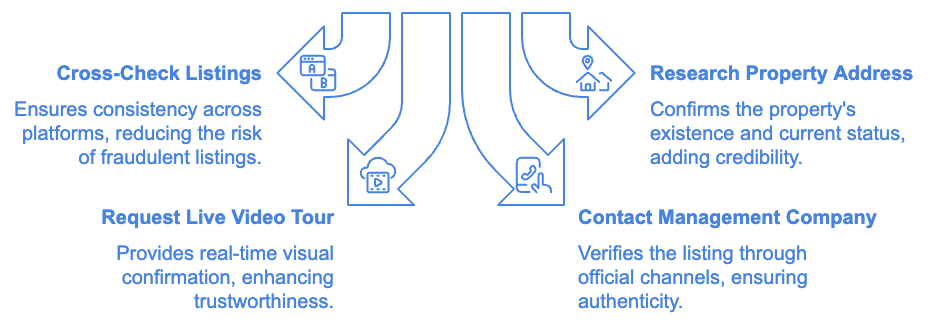
How to Tell if a Housing Application is a Scam
September 6, 2022
Why You Should Never Pay a Security Deposit Before Visiting the Property
November 12, 2022Finding a rental can be stressful enough without worrying about scams, but fake listings are a real issue in today’s rental market. At Section 8 Shield, we’re dedicated to protecting renters from scams, and we’ve spent time researching how fake rental listings work and hearing from our readers who have encountered these scams. This guide will walk you through the common tactics scammers use, what red flags to watch for, and practical tips for spotting fake rental listings online.
Why Fake Rental Listings Are So Common
Scammers create fake listings because it’s an easy way to make quick money. With the anonymity of the internet, they can quickly post an attractive listing, lure in potential renters, and disappear once they collect deposits or fees. They know that many people looking for affordable housing feel pressure to secure a rental quickly, which can lead to rushed decisions.
Our readers have told us about fake listings they’ve come across on popular sites like Craigslist, Facebook Marketplace, and other online rental platforms. These platforms don’t always verify listings, so it’s easy for scammers to blend in with real listings, which makes it critical to know how to spot them.

Common Tactics Used in Fake Rental Listings
Fake rental listings often follow a few common tactics. Knowing how these scams work can help you spot them before you’re at risk of losing money or sensitive information.
| Unusually Low Rent Prices | How It Works: Scammers know that everyone loves a good deal, so they’ll often list properties at prices much lower than other rentals in the area to attract attention. They want to make you feel like you’re getting a bargain, and that can make people overlook other red flags. What to Watch For: If the rent seems too good to be true, it probably is. Compare the listing’s price with similar properties in the area. If it’s significantly lower, be cautious. |
| Requests for Upfront Payments Before a Viewing | How It Works: Scammers often push for upfront deposits or fees, claiming they’re required to “hold” the property for you. They might say that many people are interested and that paying quickly will guarantee the rental. What to Watch For: Legitimate landlords and property managers don’t typically ask for payment before you’ve seen the property in person. If you’re being pressured to send money early, it’s likely a scam. |
| Limited Photos or Stolen Photos | How It Works: Fake listings may use just one or two photos, often of very high quality, or they may use photos stolen from other websites. Scammers may not have access to more pictures, so they try to make do with limited images. What to Watch For: Do a reverse image search on the listing photos using Google Images or TinEye. If the photos appear on multiple unrelated websites, the listing might be fake. |
| Claims That the Owner Is Out of Town | How It Works: Scammers often claim they’re out of town or even out of the country, which is why they can’t show the property in person. Instead, they’ll suggest a virtual tour (which may not be live) or ask you to trust their word. What to Watch For: If the “landlord” can’t meet in person and uses this as a reason to push for early payment, be cautious. Most legitimate landlords or property managers will have a local representative or be able to arrange for someone to show the property. |
| High-Pressure Tactics | How It Works: Scammers often try to create a sense of urgency, making you feel like you need to make a decision quickly to secure the rental. They may say other people are interested or that the listing won’t be available long. What to Watch For: Be wary of anyone who pressures you into making a quick decision. Legitimate landlords understand the need to make an informed choice and won’t rush you. |
Red Flags in the Rental Listing Itself
The listing can reveal a lot about whether a rental is legitimate. Here are some red flags to watch for in the listing details.
1. Poor Grammar and Spelling Mistakes
- Many fake listings contain errors in grammar, spelling, and punctuation. While some real listings may have minor typos, excessive mistakes can be a sign of a scam. Scammers may use poor language because they’re copying text from other sources or because English isn’t their first language.
2. No Contact Information Other Than Email
- Fake listings often avoid providing a phone number, instead using only an email for contact. Real landlords usually provide a phone number or multiple contact methods. If the listing has only one way to reach the “landlord,” it’s worth questioning.
3. Too Much or Too Little Detail
- Some fake listings provide overly elaborate details to make the property sound attractive, while others might be very vague. Look for a balanced description that seems realistic and provides specific information about the rental.
4. Copy-Pasted Text
- Scammers often reuse the same text across multiple fake listings. If you’re suspicious of a listing, try copying a sentence from it and pasting it into a search engine. If the exact text appears in several different places, it might be a reused scam listing.

How to Verify a Rental Listing’s Legitimacy
Now that you know what to look for, here are some specific steps you can take to verify a rental listing.
1. Cross-Check the Listing on Multiple Platforms
- Real listings often appear on several reputable rental sites, like Zillow or Apartments.com. If you find the listing only on free or less-regulated platforms like Craigslist or Facebook Marketplace, this could be a warning sign.
- Tip: If the listing is on just one platform, especially one known for scams, be extra cautious.
2. Research the Property Address
- Google the address of the property. In some cases, you may find previous rental listings for the same property with different landlord information or photos. This can help you determine if the current listing is genuine.
- Tip: Look at Google Maps street view to confirm the property’s appearance and location. This can help you spot discrepancies between the listing photos and the actual property.
3. Ask for a Live Video Tour
- If you can’t see the property in person, ask the landlord or agent for a live video tour where they walk through the property in real-time and answer questions. This is harder for scammers to fake than pre-recorded videos or photos.
- Tip: During the live tour, ask them to show specific things, like opening a closet or turning on lights, to make sure they’re actually on-site.
4. Contact the Property Management Company (If Applicable)
- If the property is listed as managed by a company, reach out to the company directly to confirm the listing. Real property management companies should have records of their listings and can verify if the rental is legitimate.
Safe Payment Practices
When it comes to securing a rental, following safe payment practices can help protect you from scams.
| Never Pay Before Seeing the Property | Legitimate landlords don’t expect payment before you’ve seen the property or signed a lease. If someone demands payment upfront, especially through untraceable methods like wire transfers or cash transfer apps, it’s likely a scam. |
| Use Traceable Payment Methods | Use secure payment methods, such as checks or credit cards, which leave a traceable record. Avoid cash, wire transfers, and payment apps like Venmo or Cash App, as these methods are harder to recover if you’ve been scammed. |
| Don’t Send Payment to Personal Accounts | If a “landlord” asks you to send money to a personal account, be cautious. Real property managers usually have business accounts for transactions. |
Protecting Yourself from Fake Rental Listings
Spotting fake rental listings takes awareness, research, and a little caution. Scammers rely on people’s eagerness to secure housing quickly, so taking your time and verifying details can save you from a potential loss. Remember, Section 8 Shield is here to provide resources, guides, and a platform where you can report scams and help others stay informed.
Stay safe, trust your instincts, and don’t let urgency push you into decisions without proper verification. Following these steps can help you find a secure, legitimate rental and avoid the traps set by online scammers.




